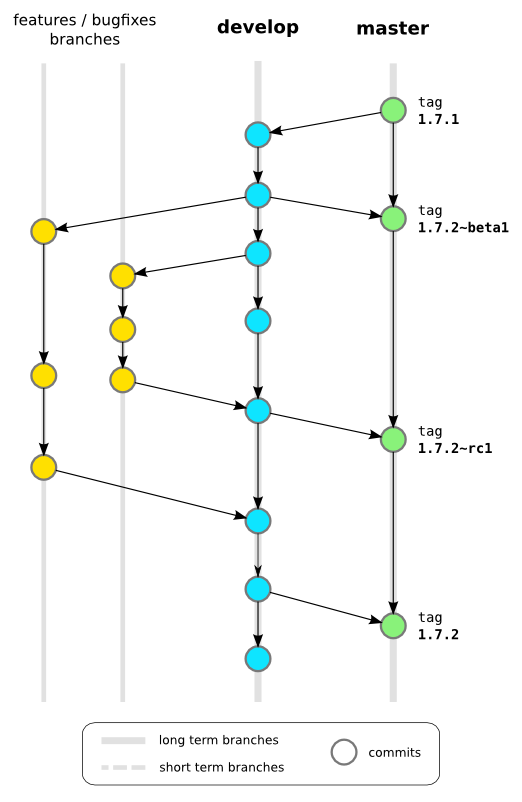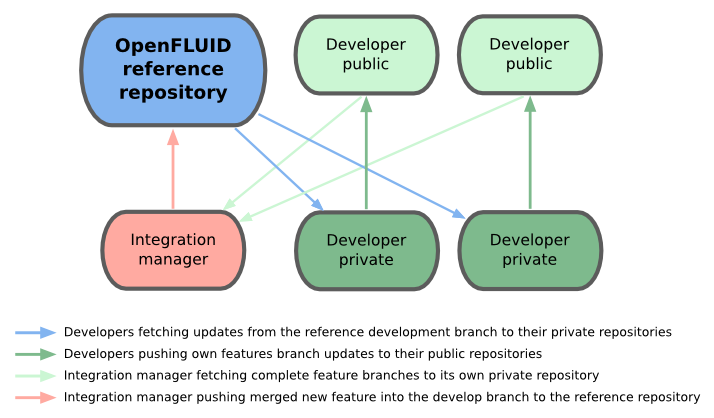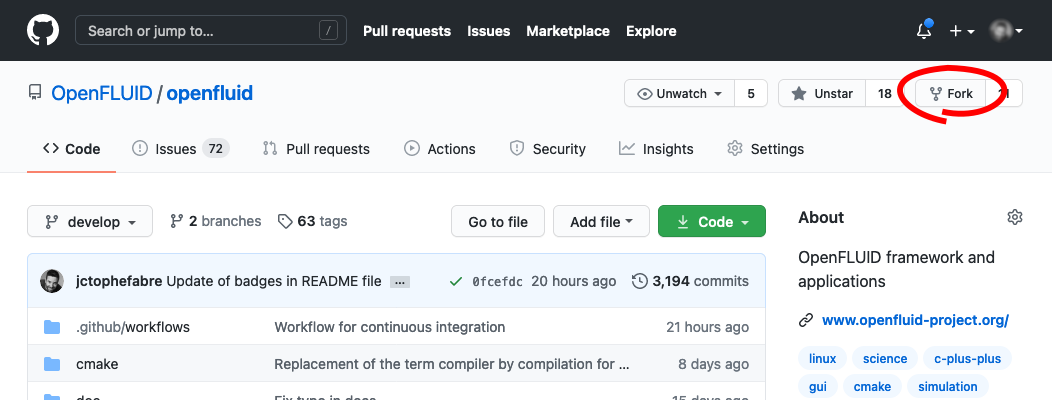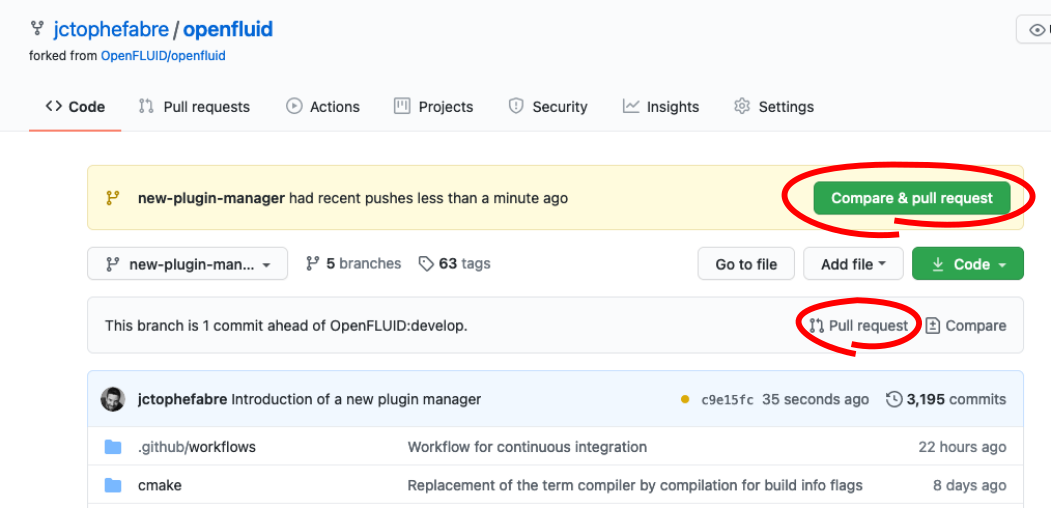The OpenFLUID source code is hosted on GitHub, and is made of several Git repositories.
They can be cloned with read and/or write access depending on your granted rights (replace username by you registered user name in the following URLs):
- OpenFLUID framework and applications : https://username@github.com/OpenFLUID/openfluid.git
- ROpenFLUID package for R : https://username@github.com/OpenFLUID/ropenfluid.git
- PyOpenFLUID package for Python : https://username@github.com/OpenFLUID/pyopenfluid.git
- OpenFLUIDjs module for node.js : https://username@github.com/OpenFLUID/openfluidjs.git
- FluidHub services : https://username@github.com/OpenFLUID/openfluid-fluidhub.git
Before using Git for the first time, configure your Git user name and email address using the following rules:
- Write you name with only first letter capitalized, e.g. John Doe (not John DOE)
- If you have several email adresses, use the email adress related to the OpenFLUID project (usually your work email address)
git config --global user.name "John Doe"
git config --global user.email "jdoe@foobar.org"
As the OpenFLUID source code management is based on Git, knowing Git basics is recommended (clone, commit, branch, fetch, merge, remote, push, ...). Some Git resources are listed at the bottom of this page, and could be a good entry point for beginners.
Branching model¶
The branching model used for the OpenFLUID developments relies on two long term branches: the master and develop branches,
and many short term branches: the features branches.
- The
masterbranch contains the source code in a ready-production state : compiles and builds perfectly, all tests run successfully. - The
developbranch, also called integration branch, contains the source code with latest delivered development works. - The features branches are used for development of single features and bug fixes, then are merged in the
developbranch.
The reference master and develop branches can only be updated by the integration manager(s).
They are public with read-only access for contributing developers.
The features branches are for developers and each branch supports the work in progress of a single new feature or a single bugfix:
- A feature branch should be named using a shot definition of the work (i.e. fix-wrong-data-id), and should be prefixed by the ticket number if any (i.e. t147-fix-wrong-data-id)
- When created, the source code must come from the
developbranch - During the branch life, the source code should be updated from the
developbranch updates - Once completed, they are merged in the
developbranch by integration manager(s). - A
featurebranch must not be deleted until it is merged in thedevelopbranch

OpenFLUID branching model using the Git scm
The OpenFLUID branching model is inspired from the Vincent Driessen and William Durand articles on successful Git branching models.
Workflow¶
Overview¶
-
The
masteranddevelopbranches are hosted on the reference Git repository on GitHub. -
The feature branches are hosted on developers repositories. These developers repositories must be public with read-only access to integration manager(s).
-
For contributing to the OpenFLUID project, it is recommended for developers to have an account on GitHub in order to host their own public repositories and use the fork system provided by this service. However, other hosting is possible so far as it provides read-only access to integration manager(s)

OpenFLUID development workflow using the Git scm (inspired from Scott Chacon's Pro Git Book)
Practical example¶
In this example, the the developer username is "username", and he uses the GitHub forking and hosting facilities for his public repository. The example feature to develop is a new plugin manager for the OpenFLUID platform that will be integrated when it will be fully developed.
On the developer's side¶

Fork button on the OpenFLUID repository page on GitHub
Prerequisite: Prepare your developer repository (should be done only once)
- Fork the reference OpenFLUID repository into your own public repository
Go on the OpenFLUID source code repository on GitHub, and click on the Fork button (top left of the page)
Note that the Fork button performs a copy of the OpenFLUID repository into the developer's public repository and do not keep repositories in sync. It is the responsability of the developer to maintain his repositories up-to-date (see below). - Clone your public repository in your private local repository
git clone https://username@github.com/username/openfluid.git
- Add the reference repository as a read-only upstream, and name it upstream
git remote add upstream https://github.com/OpenFLUID/openfluid.git
Update your local repository from the reference repository
git checkout develop
git fetch upstream
git pull upstream develop
Once updated, it is recommended to push your freshly updated private local repository to your public repository
git checkout develop
git push origin develop
Create your local branch for new feature, named new-plugin-manager in th examples below
git checkout -b new-plugin-manager develop
Do your work, commit locally (following the practices for commits). You can also push to your public repository regularly. This can be done through your IDE (i.e. Eclipse) or using the command line.
For commiting your work:
git commit -m "the message"
For pushing your work to your public repository:
git checkout develop
git fetch upstream
git pull upstream develop
git checkout new-plugin-manager
git rebase develop
git push origin new-plugin-manager
Once your feature completed and rebased on top of the current develop branch of the reference repository, submit a pull request to the integration manager.
Go to your new-plugin-manager branch and use either the "Compare and pull request" button or the "Pull request" link.

Request button and link on the developer repository page hosted on GitHub
Then fill in the pull request description and click the create button. You may also notify the integration manager that you submitted this pull request.
Once the integration manager has merged it into the develop branch of the project, and notified it to you, delete your local new-plugin-manager branch.
On the integration manager's side¶
It is assumed that the manager has already prepared his private local repository for integration. The remote named origin represents the OpenFLUID reference repository.
- Switch to the
developbranch and update changes from thedevelopbranch on the reference repository
git checkout develop
git fetch origin
git pull origin develop
- Create a local branch for the source code from the developer
git checkout -b username-new-plugin-manager develop
- Pull the
new-plugin-managerbranch from the developer public repository
git pull https://github.com/username/openfluid.git new-plugin-manager
-
Check the merged source code in order to accept or reject it: review code, and run tests
-
If accepted, merge it in the
developbranch and push the mergeddevelopbranch to the OpenFLUID reference repository
git checkout develop
git merge username-new-plugin-manager
git push origin develop
- Notify the developers about the updated
developbranch update, or notify the concerned developer about the reject of the proposed development
Git resources¶
Git basics:
- Pro Git Book by Scott Chacon (also available in french)
- Git SCM documentation
- Git Immersion
- Git Magic
Git branching model and workflow: